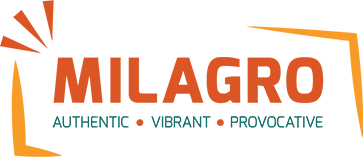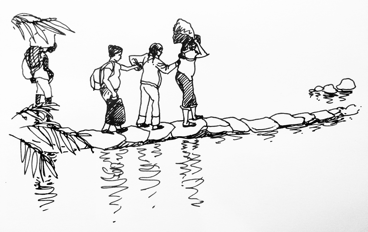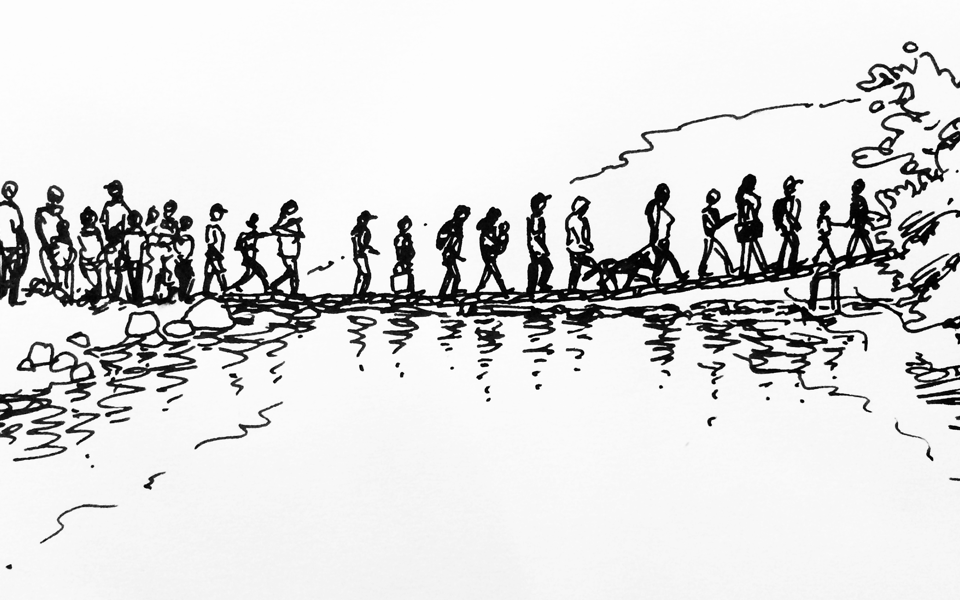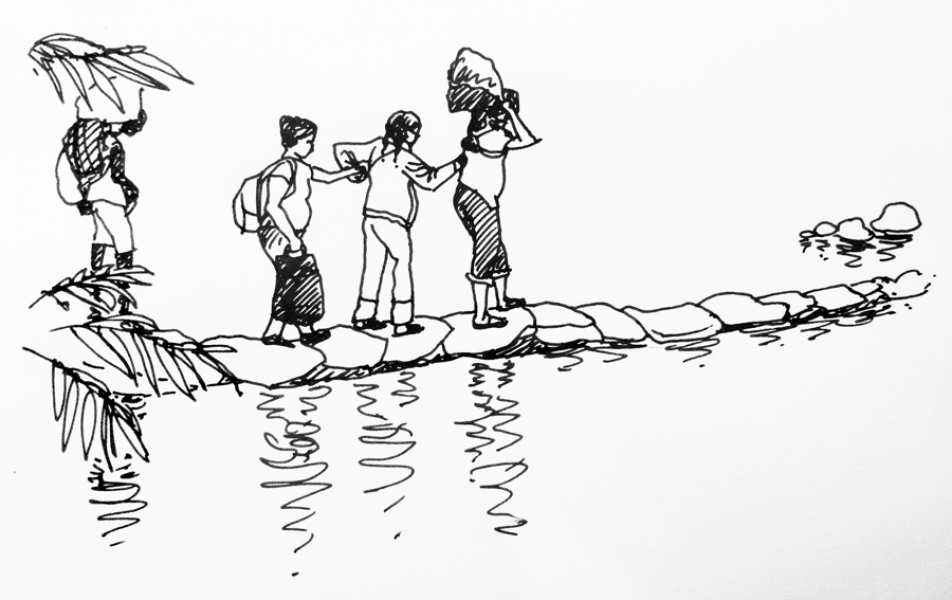Milagro presents the North American Premiere of ¿Qué Pasa Venezuela? – Stories of the Exodus in Spanish and English.
On November 2nd from 1 – 4 pm TodoSomos will host an afternoon of readings of first-person testimonies from Venezuelan refugees as they begin their journey on foot in search of safety and stability in Colombia, Ecuador, Peru, and Chile. These stories come from the streets of Cucuta, Bogota and Pamplona (a town on the border, midway through their climb over a 12,000 mountain pass).
Through these stories and the panel discussion to follow we hope to give context to the plight of those caught in the middle of the struggle for control of a country that has become a failed state, a country known for Chavismo and a country known for having the world’s largest known reserves of petroleum. The readings and panel discussion will be followed by a short reception.
WHO: TodoSomos with support of Milagro
WHAT: Qué Pasa Venezuela – readings of stories from refugees in Colombia
WHERE: Milagro Theater, 525 SE Stark Street, Portland
WHEN: November 2nd, from 1 to 4 pm
TICKETS: Admission Free of Charge; donations at the door
Space/tickets reserved though eventbrite.com
NOTE: Qué Pasa Venezuela is a bilingual reading of stories and discussion panel. Every effort will be made to quickly and accurately translate questions during the discussion.
 In October of 2018 Solymet and Douglas left a legal ledger book with numbered pages at a refugee rest house in Pamplona, Colombia.
In October of 2018 Solymet and Douglas left a legal ledger book with numbered pages at a refugee rest house in Pamplona, Colombia.
We introduced our book by asking those on their journey to write – about themselves, why they left, how they were treated, and about their hopes. Each evening between their small evening meal and sleep refugees passed the book among themselves. Among the chaos of so many in such a small space, many found a quiet where in longhand they put their story to the page.
Pamplona, high in the Andes, is located on the road that leads from the border with Venezuela to central Colombia. It’s the road most Venezuelans take to escape their country in search of safety, work and stability as they spread throughout South America. The first leg from Cucuta to Pamplona, takes 4 to 5 days by foot, this just before they must continue on their climb up and over a 12,000 foot mountain pass into central Colombia. This exodus has continued unabated for the last 24 months. Official estimates exceed 500-1000 passing this way each day. The UN estimates there are now more than 1.5 million Venezuelan refugees living in Colombia.
It’s these stories we will share at Milagro. And it’s these stories we hope to share through a series of simple bilingual books that select and focus their reason/s for leaving everything behind.
 TodoSomos registered as an NGO in Oregon in July of 2019. We have identified a board of directors and held our first meeting to review and discuss formation and bylaws. We are in the process of applying for Federal 501c3 status as a US-based Nonprofit with activity in Colombia. In September of 2019, we published several hundred copies of ‘Qué Pasa Venezuela,’ a book of stories from refugees in this rest house and on the streets of Bogota. These will not be for sale but will be given to supporters as an example of the bigger work we’d like to tackle. In the spring of 2020, we hope to publish a much larger bilingual edition that gives breadth and nuance to these stories. We have a vision of a work divided into three parts — stories of why they have left, stories of lives in Colombia and stories of the few that have chosen to return to Venezuela.
TodoSomos registered as an NGO in Oregon in July of 2019. We have identified a board of directors and held our first meeting to review and discuss formation and bylaws. We are in the process of applying for Federal 501c3 status as a US-based Nonprofit with activity in Colombia. In September of 2019, we published several hundred copies of ‘Qué Pasa Venezuela,’ a book of stories from refugees in this rest house and on the streets of Bogota. These will not be for sale but will be given to supporters as an example of the bigger work we’d like to tackle. In the spring of 2020, we hope to publish a much larger bilingual edition that gives breadth and nuance to these stories. We have a vision of a work divided into three parts — stories of why they have left, stories of lives in Colombia and stories of the few that have chosen to return to Venezuela.
We hope that in collecting these stories day to day and distilling the seminal themes and sharing representative stories, we will help those on the margins to be heard. We hope to give a global audience to the forgotten squeezed in this geopolitical struggle for power and control of the world’s largest known reserve of petroleum. We realize this may be a work of years rather than weeks or months.
 Solymet Carrero completed her studies in mechanical engineering in San Cristóbal -Venezuela. Her family is spread between San Cristobal, Venezuela and Pamplona, Colombia. Solymet has a huge heart and when I mentioned the idea of a storybook to collect the personal testimonies of Venezuelans on the road she immediately recognized its importance. Within a day she had a methodology, the book , a poster and had convinced Dona Marta, the owner of the Refugio in Pamplona, to let her give it a try. Solemet has an interest in continuing and improving this story collecting and telling initiative (encouraging depth and focus to stories) and finding ways to best support refugees as they are forced to continue on the road to Bucaramanga. Always optimistic and hopeful she believes in meditation as a means to introspection and of healing and evolution. She reminds us all, “Everything is simpler if you wake up early and meditate”.
Solymet Carrero completed her studies in mechanical engineering in San Cristóbal -Venezuela. Her family is spread between San Cristobal, Venezuela and Pamplona, Colombia. Solymet has a huge heart and when I mentioned the idea of a storybook to collect the personal testimonies of Venezuelans on the road she immediately recognized its importance. Within a day she had a methodology, the book , a poster and had convinced Dona Marta, the owner of the Refugio in Pamplona, to let her give it a try. Solemet has an interest in continuing and improving this story collecting and telling initiative (encouraging depth and focus to stories) and finding ways to best support refugees as they are forced to continue on the road to Bucaramanga. Always optimistic and hopeful she believes in meditation as a means to introspection and of healing and evolution. She reminds us all, “Everything is simpler if you wake up early and meditate”.
 Roger Fajardo is a medical doctor and a yoga teacher who is working for Rappi, (a food delivery service in Bogota) as he works to get his medical credentials recognized in Colombia. He chose medicine as a career to be of service to others. When he studied at the Universidad Central de Venezuela, he volunteered in a program that visited and provided care for indigenous ethnic groups in Maniapure, Bolivar State. He volunteers at “Manitas Amarillas,” a medical foundation in Colombia that helps Venezuelans and people at risk. His favorite saying is from Mother Theresa, “A life not lived for others is not a life.”
Roger Fajardo is a medical doctor and a yoga teacher who is working for Rappi, (a food delivery service in Bogota) as he works to get his medical credentials recognized in Colombia. He chose medicine as a career to be of service to others. When he studied at the Universidad Central de Venezuela, he volunteered in a program that visited and provided care for indigenous ethnic groups in Maniapure, Bolivar State. He volunteers at “Manitas Amarillas,” a medical foundation in Colombia that helps Venezuelans and people at risk. His favorite saying is from Mother Theresa, “A life not lived for others is not a life.”
 Daniela Marquez trained as a medical/bio technologist and microbiologist. She has worked as a technician and supervisor in the private sector. Currently living in Bogota, Dani is working as a yoga and acroyoga teacher. She offers classes for free to Venezuelans in Bogotá. She volunteers in a Medical Foundation called “Manitas Amarillas” that helps Venezuelans. When asked about collecting and telling the stories of Venezuelans in Colombia, Daniela volunteered to be the reader for the initial videos and was excited about the idea of collecting stories from Venezuelans. Her favorite saying is “Love can light up the world”.
Daniela Marquez trained as a medical/bio technologist and microbiologist. She has worked as a technician and supervisor in the private sector. Currently living in Bogota, Dani is working as a yoga and acroyoga teacher. She offers classes for free to Venezuelans in Bogotá. She volunteers in a Medical Foundation called “Manitas Amarillas” that helps Venezuelans. When asked about collecting and telling the stories of Venezuelans in Colombia, Daniela volunteered to be the reader for the initial videos and was excited about the idea of collecting stories from Venezuelans. Her favorite saying is “Love can light up the world”.
 Douglas Lyon is a physician and epidemiologist with a long history of working in complex refugee emergencies with MSF, CDC and UNHCR. He believes that physicians, given their oath to heal and care of the most vulnerable have a duty to speak out and speak up when they see wrong — whether it relates to the direct care of patients or the result of failing systems, institutions or governments. In addition to the practice of medicine, he aspires to help with change through the written and spoken word. His favorite expression is, “Sunlight is the Best Disinfectant.”
Douglas Lyon is a physician and epidemiologist with a long history of working in complex refugee emergencies with MSF, CDC and UNHCR. He believes that physicians, given their oath to heal and care of the most vulnerable have a duty to speak out and speak up when they see wrong — whether it relates to the direct care of patients or the result of failing systems, institutions or governments. In addition to the practice of medicine, he aspires to help with change through the written and spoken word. His favorite expression is, “Sunlight is the Best Disinfectant.”
Through the collection and sharing of narratives we commit ourselves to creating an honest, apolitical, broad, clear picture of this historical moment. We commit to a methodological rigor to ensure we collect and share unbiased stories. We commit to publish and share in a way that protects the anonymity of the authors unless they have expressly given us permission to attribute their work. Specifically:
- All testimonies/stories are first-person and handwritten. These are collected in accounting ledger books with numbered pages. After review and abstraction these will be stored and available for reference on request.
- Field staff will be trained to introduce the initiative and provide a safe neutral space where migrants can write, with emphasis on their personal and family story.
- There is no compensation for their writing other than in-kind food and/or accommodation as offered to other refugees. In urban centers when seeking hand-written stories from Venezuelans on the street, support may include providing a meal to the writer and any family members who accompany them.
- The selection of stories and abstracts for publication and spoken word performances will be chosen by a three-person team, which will include a journalist, the NGO’s director, and a board member.




